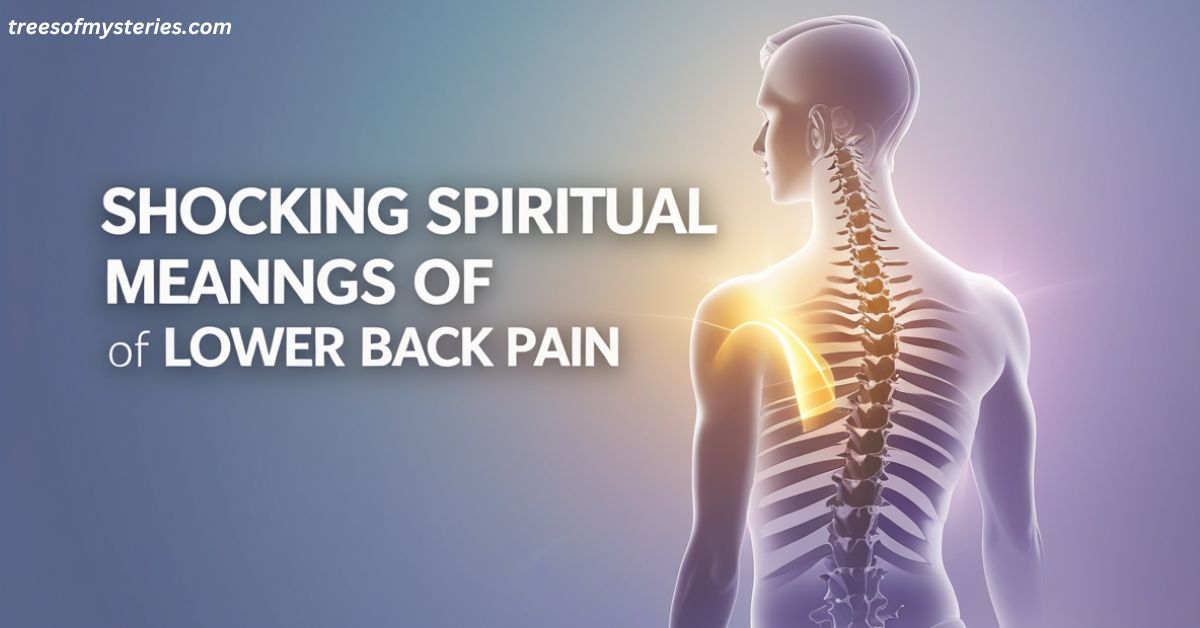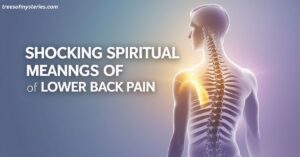“Shocking Spiritual Meanings of Lower Back Pain” refers to the hidden messages our bodies send us through physical discomfort. This pain often reflects deeper emotional struggles. Understanding this connection can lead to healing and insight.
Have you ever thought that your body might be trying to tell you something? Lower back pain can be more than just a physical issue. It can also reveal important emotional truths that we often overlook.
The spiritual meanings behind lower back pain can be surprising. It often relates to feelings of insecurity, stress, or fear. By exploring these meanings, we can find ways to heal and feel more balanced in our lives.
Low Back Pain Spiritual Meaning
Low back pain often carries a deeper message. This discomfort can reflect emotional burdens like stress, guilt, or fear. When someone feels this pain, it may signal unresolved feelings. Understanding these spiritual meanings helps people find healing. This pain serves as a reminder to look within and address emotional stress.
Many believe that lower back pain represents the need for spiritual healing. It can show that a person holds onto negative feelings. This may lead to muscle tension and physical discomfort. Recognizing these signs is important.
Finding ways to release this emotional tension helps ease the pain. Activities like meditation or talking to someone can promote healing. By taking these steps, individuals can achieve better well-being and peace.
Stress
Stress is a common feeling that many people experience. It can come from different sources, like school, family, or friendships. When someone feels overwhelmed by these pressures, it can lead to physical problems. One common issue is lower back pain. This pain often relates to how much stress a person carries.
Tension and anxiety are signs of stress. When people do not manage their emotional burdens, they may develop muscle tightness. This tightness can cause discomfort in the lower back. Understanding this connection helps individuals see that their body reacts to their feelings. Recognizing signs of emotional tension is important for health.
Managing stress can improve overall well-being. Simple activities like walking, talking to friends, or practicing meditation can help reduce stress. These methods promote relaxation and support mental health. By addressing stress, individuals can find relief from lower back pain and improve their quality of life.
Fear
Fear is a strong emotion that everyone feels at times. It can come from different sources, like worrying about school or personal problems. When fear takes control, it can create tension in the body. This tension often leads to lower back pain. Understanding the link between fear and physical discomfort is important.
The body reacts to fear with stress. Muscles can tighten and lead to soreness, especially in the lower back. Feeling scared may not only affect emotions but also the body. Managing fear helps reduce discomfort. Recognizing what causes fear is the first step toward healing.
Finding ways to cope with fear is essential. Simple techniques, like deep breathing or talking about feelings, can help. These practices promote relaxation and emotional strength. By addressing fear, individuals can ease their lower back pain and improve their overall health and happiness.
You’ll Love: Understanding the Spiritual Meaning of Dead Birds: Biblical Symbolism
Grief
Grief is a natural feeling that comes after loss. Losing a loved one or ending a relationship can create deep sadness. This emotion can weigh heavily on the heart and mind. When grief is not processed, it can lead to physical issues, like lower back pain. The body often holds onto this emotional pain.
Feelings of sorrow can cause tension in the muscles. When someone is sad, the body may react with stiffness or discomfort. This reaction can show as lower back pain. Understanding this connection helps individuals seek healing for both the body and mind. Acknowledging grief is a first step to relief.
Coping with grief takes time and care. Talking to friends, writing in a journal, or seeking support can help. These actions promote emotional healing. By addressing grief, individuals can lessen their lower back pain and find peace in their journey.
Guilt

Guilt is a heavy feeling that can burden the mind. It often arises when someone believes they have done something wrong. This deep sense of regret can impact a person’s well-being. Tension from guilt can lead to physical pain, such as lower back pain. Recognizing this connection is important for healing.
Emotions like guilt can cause the body to react negatively. Muscles may tighten, leading to discomfort or soreness in the lower back. This pain can remind individuals of their emotional struggles. Understanding how guilt affects the body is the first step toward finding relief.
Finding ways to cope with guilt is essential for health. Talking about feelings with others or practicing self-forgiveness can help. Engaging in positive activities can also lighten guilt. By facing guilt, individuals can ease their lower back pain and improve overall well-being.
Anxiety
Anxiety is a common feeling that many people experience. It often comes from worries about the future or everyday life. This intense fear can lead to physical symptoms, including lower back pain. Understanding the connection between anxiety and pain is important for overall health.
The body responds to anxiety with muscle tension. When a person feels anxious, muscles may tighten and result in discomfort in the lower back. This reaction is the body’s way of showing distress. Recognizing anxiety’s impact on physical health is essential for finding solutions.
Coping with anxiety can improve well-being. Techniques like deep breathing, mindfulness, or seeking support can help reduce feelings of anxiety. These practices promote relaxation and emotional balance. By addressing anxiety, individuals can find relief from lower back pain and enhance their quality of life.
Anger
Anger is a strong emotion that everyone feels at times. It can arise from different situations, like arguments or frustrations. When anger is not expressed, it can cause problems in the body. One common issue is lower back pain. Understanding how anger affects physical health is important.
The body often reacts to anger with tension. Muscles may tighten, creating discomfort in the lower back. This physical pain can be a signal to address underlying emotions. Recognizing the connection between anger and pain helps individuals find ways to manage their feelings.
Finding healthy outlets for anger is essential. Activities like exercise, writing, or talking about feelings can help release pent-up emotions. These actions support emotional health and reduce physical discomfort. By addressing anger, individuals can ease their lower back pain and promote overall well-being.
Insecurity
Insecurity is a feeling of not being good enough or valued. It can lead to constant worry about how others see us. This feeling can weigh heavily on the mind and body. When insecurity is not addressed, it can cause lower back pain. Understanding this link is vital for personal health.
Tension from insecurity can show up as tight muscles. When someone feels insecure, the body may react with discomfort. Lower back pain can be a physical reminder of these emotional struggles. Recognizing this connection helps individuals take steps toward healing.
Building self-esteem is important for overcoming insecurity. Simple actions, like practicing self-compassion or setting small goals, can boost confidence. Positive affirmations and support from friends also help. By addressing insecurity, individuals can reduce their lower back pain and improve their overall happiness.
Overburden
Overburden is a feeling of being overloaded with responsibilities. It can come from school, chores, or personal issues. When someone carries too much weight, both emotionally and physically, it can lead to problems. One result can be lower back pain. Recognizing this connection is essential for well-being.
The body often holds tension from being overburdened. Muscles in the back may tighten, leading to discomfort. This physical pain is a signal that it’s time to lighten the load. Understanding how being overburdened affects the body can help individuals seek balance.
Finding ways to manage responsibilities is key. Prioritizing tasks and asking for help can lessen the feeling of being overwhelmed. Taking breaks and practicing self-care are also important. By addressing the feeling of being overburdened, individuals can ease their lower back pain and enhance their quality of life.
Resentment
Resentment is a feeling of anger or disappointment towards someone. It often stems from feeling wronged or not appreciated. Holding onto resentment can weigh heavily on the heart and mind. This emotional burden can lead to physical issues, including lower back pain. Understanding this connection is vital for healing.
When someone feels resentment, their body may react with tension. Muscles can tighten, causing discomfort in the lower back. This pain often serves as a reminder of unresolved feelings. Recognizing how resentment impacts the body is a step toward finding relief.
Finding ways to let go of resentment is important for health. Talking to someone trusted or writing about feelings can help release negative emotions. Practicing forgiveness and expressing feelings can also ease this burden. By addressing resentment, individuals can reduce their lower back pain and improve their overall happiness.
Frustration

Frustration is a feeling that arises when things do not go as planned. It can come from small annoyances or significant obstacles. This feeling can create stress in the body and mind. When frustration builds up, it can lead to lower back pain. Understanding this connection can help with managing emotions.
The body’s response to frustration often includes muscle tension. When someone feels frustrated, the muscles in the back may tighten, leading to discomfort. This reaction can show physical signs of emotional distress. Recognizing the impact of frustration on physical health is important for finding solutions.
Finding ways to cope with frustration is essential. Strategies like taking deep breaths, stepping away from the situation, or talking it out can help. Engaging in hobbies or physical activities can also ease feelings of frustration. By managing frustration, individuals can lessen their lower back pain and enhance their quality of life.
Lower Back Pain Biblical Meaning
Lower back pain can hold significant meaning in a biblical context. Many believers interpret physical discomfort as a reflection of emotional or spiritual struggles. In the Bible, different afflictions often symbolize deeper issues. For some, lower back pain may represent a heavy burden carried in life. This burden might come from sin, guilt, or unresolved conflicts.
Scripture emphasizes the importance of emotional and spiritual health. In various passages, individuals express their pain and seek comfort through faith. For instance, Jesus offers healing to the weary and broken-hearted. Believers often find strength in prayer and community support. This connection between spiritual health and physical well-being highlights the importance of holistic care.
Understanding the biblical meaning of lower back pain encourages individuals to reflect on their lives. It invites them to explore emotional burdens and seek healing. Embracing faith, forgiveness, and hope can lead to relief from physical discomfort. This holistic approach promotes not only physical healing but also emotional and spiritual growth.
Must Read: Blue Jay Spiritual Meaning: Symbolism and Love Revealed
What Does Lower Back Pain Represent
Lower back pain can symbolize many things in life. It often shows a burden that someone carries. This burden might come from stress, worry, or emotional struggles. The body can react to these feelings with pain. Understanding this connection helps people see that their feelings affect their health.
Emotional tension can lead to physical problems. When someone feels anxious or overwhelmed, the back may ache. This discomfort can be a warning sign from the body. Recognizing these signs is the first step toward healing. Acknowledging feelings can help ease lower back pain and improve overall well-being.
Finding support is important for those dealing with pain. Talking to friends or family can help share the load. Engaging in relaxing activities, like yoga or meditation, can also provide relief. By addressing emotional burdens, individuals can reduce their lower back pain and promote a healthier life.
Lower Spine Pain Symptoms
Lower spine pain often comes with various symptoms. Commonly, individuals feel discomfort or ache in the lower back area. This pain can vary in intensity. Some might experience constant dull pain, while others could feel sharp bursts. Noticing these differences is important for understanding the condition.
In addition to pain, people might notice stiffness in the lower spine. Movement can become challenging or painful. This stiffness can limit daily activities, making it hard to bend or twist. Some may also experience muscle spasms, which are sudden and strong contractions in the back muscles. Recognizing these symptoms helps individuals seek appropriate care.
Numbness or tingling can occur in the legs or feet as well. This sensation can point to nerve issues related to lower spine pain. When these symptoms arise, it is crucial to consult a healthcare professional. Early intervention can lead to better outcomes and relief from lower spine pain.
Frequently Asked Questions
What emotion is related to lower back pain?
Lower back pain is often linked to emotions such as stress, anxiety, and feelings of insecurity. These emotions can create tension in the body, leading to pain.
What chakra is related to lower back pain?
The root chakra is related to lower back pain. This chakra represents stability, security, and grounding. Imbalances in this chakra can lead to physical discomfort in the lower back.
What is the significance of lower back pain?
Lower back pain can signify emotional or physical stress. It often reflects underlying issues in life, like unresolved conflicts, anxiety, or feeling overwhelmed by responsibilities.
What can lower back pain signify?
Lower back pain can signify emotional baggage or heavy burdens. It may indicate feelings of insecurity or a lack of support in life, calling for self-reflection.
Final Thoughts
In conclusion, lower back pain is an important signal from our bodies. It often shows the stress and emotions we carry, like anger, anxiety, or insecurity. Understanding this link helps us deal with the pain and the feelings behind it. By being aware of our emotions, we can take steps to feel better both physically and emotionally.
Recognizing symptoms like stiffness, sharp pain, or tingling is also key. These signs can tell us more about our lower spine’s health and how it connects to our feelings. Getting support from friends, family, or healthcare professionals can help ease the pain and improve our daily lives. Simple activities like relaxation techniques and gentle exercises can make a big difference in recovery.
Finally, looking at the spiritual side, like our connection to the root chakra, adds more understanding to lower back pain. By working on our emotional burdens and finding balance in our lives, we can reduce discomfort and promote healing. This approach highlights the importance of taking care of both our emotions and our physical health, leading to a happier, healthier life.











